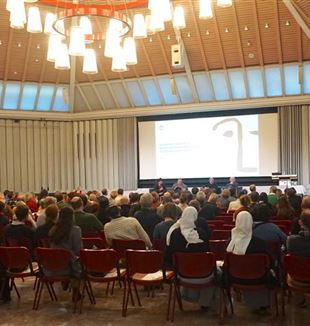
Germany: "Who am I?"
"Identity and Identities" was the theme of this year's Rhein-Meeting, which was back in person after three years. From Benedict XVI to Ukraine, from politics to theology... The three day event in Cologne.Who am I and If So How Many? was the title of a bestseller by philosopher David Precht, still very much in vogue today. The question of individual identity has also long since become a political issue. Not only selfies or Facebook are synonymous with self-definition or self-assurance. So-called identity politics, whether left or right, ultimately boil down to the question of identity and belonging, that is, the question, "Who am I?"
The Rhein-Meeting held this year in Cologne also addressed this issue. For the past four years the Meeting was cancelled because of the pandemic and had only been held online. From March 10 to 12, around 800 visitors from all over Germany and abroad finally gathered in person to explore the theme "Identity and Identities."
It was not about philosophical theories, but about lived experiences. In a sense the Meeting, which took place at the Maternushaus in Cologne, with its lectures, panel discussions, debates and meetings, but especially thanks to the contribution of the many volunteers, was already an attempt at an answer. Of course, the dinner, enlivened by singing and washed down with our Kölsch beer in one of the traditional breweries on the banks of the Rhine, could not be missed.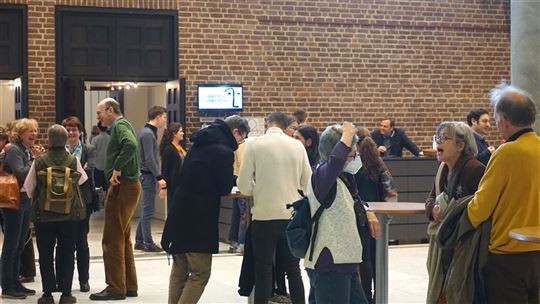
Only a few people have been able to express this existential uncertainty, not to say the self-estrangement of modern man, better than the French philosopher Jean-Paul Sartre, who even felt that even his own hands were extraneous. The Dresden philosopher of religion, Albrecht Voigt, expressed the same feeling more humorously: "And when I look in the mirror in the morning, I realize that I do not know you, but I wash you anyway."
Who is this? Who am I? Voigt drew the exact opposite conclusion from Romano Guardini, from this perception of one's corporeality: my very body shows me unequivocally that I am not a stranger to myself, but that I am "given." At the origin of my life is not my own decision, but the initiative of another, Voigt said. My character, with its inclinations and uniqueness expressed in my actions, was not decided by me. In other words, in no instant am I the one who creates me.
Fr. Giussani also starts from this fundamental experience. Fr. Gianluca Carlin, president of Rhein-Meeting, recalled Giussani's words in The Religious Sense: "The 'I,' man, is that level of nature in which it realizes that it does not make itself. So that the whole cosmos is like the great periphery of my body." This perception lets me understand that it was another who created me. For Giussani, this leads to the awareness that "I am You who make me." Furthermore, my identity is part of this relationship, "not as something external, but as my being." But with that begins a movement of seeking this other as a prerequisite for my human fulfillment, which, however, always runs the risk of identifying this other with something provisional and ideologically absolutizing it.
What are the social consequences when one links one's identity, or rather one's dignity, to belonging to a certain minority, race, nation, or to one's perception of gender? Wolfgang Thierse, former president of the Bundestag and a prominent Catholic, addressed these questions in his talk titled "Civic Sense Under Pressure: How Much Identity Politics Can a Society Take?" Thierse, who also served as chairman of the SPD Commission on Fundamental Principles, sparked a heated debate two years ago with a controversial article that appeared in Frankfurter Allgemeine Zeitung.
As a recent example of identity politics leading to cancel culture - the banning of statements or symbols deemed offensive - he cited the removal of the historic cross from the Friedenssaal, the Hall of Peace in Münster City Hall, at the G7 foreign ministers' meeting. The Foreign Ministry had arranged for the removal to avoid alleged instrumentalization. "But by whom?" asked Thierse. The same goes for the request to remove the inscriptions with references to God on the dome of the recently rebuilt Berlin Castle. In this case, self-righteousness leads to ideological erasure of history, the former parliament speaker warned.
"It is not the conflict that bothers me: it is part of liberal democracy," Thierse stressed, "What bothers me is the ideological exaggeration that celebrates autonomy as the pinnacle." The same goes for "disconcertment," understood as a last resort. It is important, but it should not be used to "evade reasonable argumentation." This would destroy any social dialogue. The consequence would be an "egocentric libertarian narcissism" that undermines the foundations of social solidarity.
Among the reasons for this development, Thierse cited the fact that religion and common cultural traditions are losing importance in society. At the same time, he continued, the question of what holds a society together, that is, what are the prerequisites for democracy and the common good, is becoming more pronounced. Thierse - who as a staunch democrat and practicing Christian has remained faithful to his faith despite all the inconveniences this might have entailed then in the GDR - believes that it is precisely Christians today who are obliged to put forward their conception of society and "their conviction of a fulfilled life," not in a triumphalist way, but with "sober authenticity, but free from fear."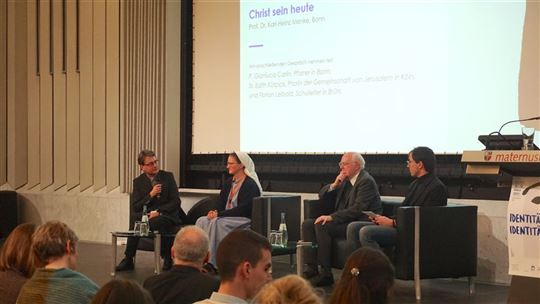
Where then is the core of Christian identity? For Karl-Heinz Menke, a theologian from Bonn and winner of the 2017 Ratzinger Prize, it "coincides practically with looking to Christ." Christianity is not a "moral gym, a worldview or a theory," but means "letting Christ into one's life, determined by wounds and limitations," Menke explained in his talk. The saints, in particular, have shown how Christ can "transform my story of sin into redemption." As an example, he cited Ignatius of Loyola. For the founder of the Jesuit order, this insight was decisive: "I do not have to do anything special, but just allow Christ to enter my poverty and let him transform me."
For Menke, the life of Frenchman Jacques Fesch is an example of the fact that no preconditions are necessary except the desire of the heart. Fesch, a "dandy and murderer," was born in 1930 in Saint-Germain-en-Laye, and his process of beatification is currently underway. He came from a respectable banking family, married young, left a wife and child, and had a second child by another woman. When he decided to set sail for the South Seas in a sailboat, his father refused him the money to buy it. He then robbed a bank and shot a policeman during his escape. In prison he came to a radical conversion and kept a diary. In his last notes before he was guillotined in 1957, he wrote, "In five hours I will see Jesus." On the eve of his execution he reconciled with his wife. According to Menke, his mystical writings can be counted among the greatest texts in Christian literature.
The true indicator of holiness, according to Menke, is joy: "There are no sad saints, only joyful ones." Communion with Christ is a gift, so "I do not have to set an agenda for myself or compare myself with others."
Another decisive aspect for Menke is this: the encounter with Christ is not a private affair. Already the early Christians were distinguished by an attitude that was nothing short of revolutionary in relation to the prevailing mentality in the Roman Empire. "For them, every single human being was elevated to the rank of brother or sister," says the theologian. "From the very beginning, Christians lived charity not only toward other Christians, but towards everyone." A "privatized relationship" would therefore be at odds with Christianity. Menke believes that it was primarily the Gnostics who made faith a private matter. According to Menke, the sacraments mark the communal dimension of the relationship with Christ, first and foremost baptism as inclusion in ecclesial communion. "All sacraments are never intended for myself alone." This applies as much to marriage as it does to priestly ordination, confirmation and especially to the Eucharist.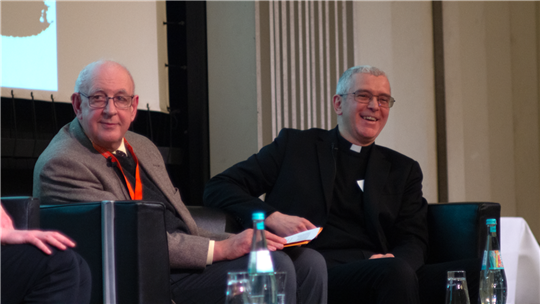
The testimony of Sister Edith Kürpick, Prioress of the Jerusalem Monastic Fraternity in Cologne, testified to how this translates concretely into life. The nuns live their monastic life in the heart of the city. "Every city is a desert, with its charms and its dangers." She described their vocation thus: "We want to be servants of hope through our lives and a liturgy open to all." Thus, some of the religious women serve in the world of work under the "categorical imperative" that every person is loved unconditionally. Thus faith also becomes a challenge: "Stand firm on your own two feet and go your own way."
Two particular events in the Church and in the world characterized the topics addressed at the beginning and end of the Rhein-Meeting: the death of Benedict XVI and the Russian aggression against Ukraine. In both meetings, the significance of lived Christian identity emerged clearly.
At the opening of the Rhein-Meeting on Friday evening, some former students spoke of their encounters with Joseph Ratzinger. Fribourg theologian Josef Zöhrer met him in 1971, when he was still a young student. That time, Zöhrer explained, was in some ways very similar to our own. "Everything was being questioned, under the motto, 'The Church must convert to the world.'" However, a "euphoric excitement about the new beginning" prevailed at the time. Having fallen into a vocational crisis, Zöhrer went to Regensburg to Professor Ratzinger, a professor of theology who was already universally renowned. "I felt taken seriously by him in every respect," even though Ratzinger had given him "no profound answers." On the contrary, he had encouraged him to "observe carefully and verify what has value." Ratzinger, moreover, always "kept a long leash" on his doctoral students, Zöhrer among them, granting them "a lot of freedom," as a kind of community. It was always clear what "the faith of the Church represented for him, something we receive and do not give ourselves." Thus every meeting began with Holy Mass.
But Ratzinger always gave importance to scientific rigour and he would sometimes react abruptly, especially in the face of schematisms, Zöhrer recalled. It is significant that Ratzinger did not found a theological system or school; however, as Irenaeus of Lyon stated, Jesus Christ is the "the true point of reference from which we must read and consider reality in an ever new way." Thus, his theology is characterized by openness: being on the path towards Christ as a constant search for his face.
Once, Zöhrer recounted, the famous theologian Karl Rahner, who had just published his work Fundamental Course on Faith, was invited to a meeting with Ratzinger's doctoral students. He had expressed puzzlement that one could speak of three Persons by referring to the Trinity, and suggested instead describing them as "distinct modes of subsistence." Ratzinger basically did not contradict him, but merely noted, "Only one Person can be prayed to, but not a distinct mode of subsistence." For Zöhrer, what characterized Ratzinger was "the coexistence of breadth of outlook and clarity on the problem, coupled with his modesty and ability to value persons."
In this regard, Christoph Ohly, rector of the Cologne University of Catholic Theology, spoke of a "symphonic reciprocity" and recalled Ratzinger's love for Mozart. For him personally, Ohly recounted, the meeting with Ratzinger was, so to speak, a "mark" on his own vocation. He met him for the first time in 1985, at the Good Friday liturgy in the Teutonic Cemetery. What struck him immediately was Ratzinger's Ars celebrandi. He succeeded in "fully enhancing what must happen."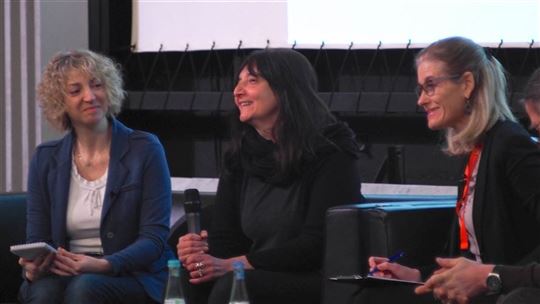
Third to speak was Fr. Paolo Sottopietra, Superior General of the Priestly Fraternity of the Missionaries of St. Charles Borromeo, who told those present about his experiences with Cardinal Ratzinger/Pope Benedict XVI, whom he considers a particularly sensitive person. During a visit to the San Carlo house in the 1980s, for example, Ratzinger turned around one last time before leaving, walked into the kitchen and thanked the cook for the good food. This empathy with people also shaped his thinking: "He made other people's questions his own. He identified with the restlessness of the contemporary person." Later, when he was pope, he was asked for advice on what should be given particular priority in the formation of candidates for the priesthood; Benedict XVI replied, "He must have an openness to the situation of current thinking and respond to the often desperate situations of the contemporary person." For Sottopietra, the Pope Emeritus was a person "deeply convinced of his own identity, he simply witnessed to it with his life and proposed it."
Read also - "A life live to the full": happening now in Dublin
The conclusion of the Rhein-Meeting on Sunday morning was entirely marked by the testimony of such a concretely lived identity. Elena Mazzola, president of the Kharkiv-based NGO Emmaus, which cares for young people raised in orphanages, spoke of her arduous escape from Ukraine with girls and young women with physical and mental disabilities. It took several days of travel to arrive safely in Italy, from Kharkiv via Lviv. Elena Mazzola effectively described the devastation that war causes in people's souls, and which is deeply scarring Ukrainians. Yet, even in this conflict, hope manifests itself through seemingly insignificant events.
She then told the story of Tanja, who as a child had to witness first the death of her father and then the killing of her mother by her new partner. She later found refuge at Emmaus and fled to Italy with Mazzola.
One time when Russians and Ukrainians had to share the same stage at an event in Italy, the latter said they could not stand it: "Right now we can only hate. Everything is so unfair. They are killing us and no one in Russia is doing anything to stop it," the Ukrainian friends said. Mazzola recounted how she had answered, "Hate hurts you first, and you pass it on to your children." But they replied, "Our children already hate." Then Tanja intervened, "Since I have been in Emmaus, I have forgiven the man who killed my mother."
They had never discussed this with Tanja, Mazzola pointed out. "She herself experienced a loving gaze and understood that Christ is present in this community. There was no need to be super-intelligent. She understood that in order to be happy, you have to forgive."
But even Mazzola herself does not have an easy answer to the dramatic situation of war. She warned against being "naive." "The situation is worse than we think. At the moment, there seems to be no possibility of peace talks." However, she continued, there are different levels: "Those who have to do diplomacy do it. Those who have to defend themselves do it. But we have to create a space of truth and love." Tanja's testimony "is not just a beautiful story, just as the birth of Jesus Christ in the Roman Empire was not a beautiful story. This is the reality that saves the world."